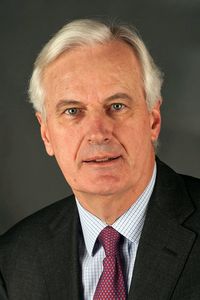Michel Barnier, a prominent figure in modern European politics, entered this world on January 9, 1951, in the picturesque town of La Tronche, nestled in the heart of the French Alps. His family, deeply rooted in the Gaullist tradition, played a significant role in shaping his early life and political beliefs. His father, a skilled craftsman with a passion for leather and textiles, instilled in Michel a strong work ethic and a sense of responsibility from a young age.
As a youth, Michel's interests were diverse and multifaceted. He was an active member of the scouting movement, where he developed valuable skills and forged lasting bonds with his peers. Additionally, his involvement in the church choir allowed him to cultivate his musical talents and foster a sense of spirituality.
After completing his secondary education, Michel pursued higher studies at the esteemed École Supérieure de Commerce de Paris. In 1972, he proudly received his diploma, marking the beginning of a successful and illustrious career that would take him to the highest echelons of European politics.
Barnier's political journey commenced in the 1970s, marked by a stint on the staff of prominent Gaullist ministers, laying the groundwork for a distinguished career in public service.
As the decade drew to a close, in 1978, at the tender age of 27, Barnier made a significant milestone, securing election to the French National Assembly as deputy for the Department of Savoie. This notable achievement was accomplished while representing the neo-Gaullist Rally for the Republic (RPR),a party that shared his political ideals.
Throughout the subsequent years, Barnier remained committed to his role in the National Assembly, serving until 1993, a testament to his dedication and passion for public service.
Barnier's significant milestones began in 1992, when he collaborated with Jean-Claude Killy to orchestrate the Winter Olympics in Albertville, assuming the esteemed role of co-president of the COJO.
Following the Right's resounding victory in the 1993 legislative election, Barnier was invited to join the French Cabinet, where he held the prestigious position of Minister of the Environment.
Barnier's tenure as Minister of the Environment lasted until 1995, when Jacques Chirac appointed him secretary of state for European affairs, marking a new chapter in his illustrious career.
Note: François Barnier
As a dedicated and accomplished individual, Michel Barnier embarked on a distinguished career in European politics, commencing with his tenure as a European Commissioner for Regional Policy within the Prodi Commission, a position he held from 1999 to 2004.
Following his tenure as Commissioner, Barnier was appointed to serve as the Foreign Minister of France, a role he undertook as part of Jean-Pierre Raffarin's government, from which he served until 2005.
However, Barnier's tenure as Foreign Minister was cut short due to the defeat of the presidential majority in the 1997 legislative election, which ultimately led to his replacement by Philippe Douste-Blazy.
In the year 2006, a significant event took place as Barnier was elected to the esteemed position of vice president of the European People's Party, a prestigious political organization, for a term of three years, marking a notable milestone in his professional journey.
He then re-joined the French Cabinet, assuming the role of Minister of Agriculture, under the leadership of President Nicolas Sarkozy, in the year 2007, continuing to make a lasting impact on the French political landscape.



















